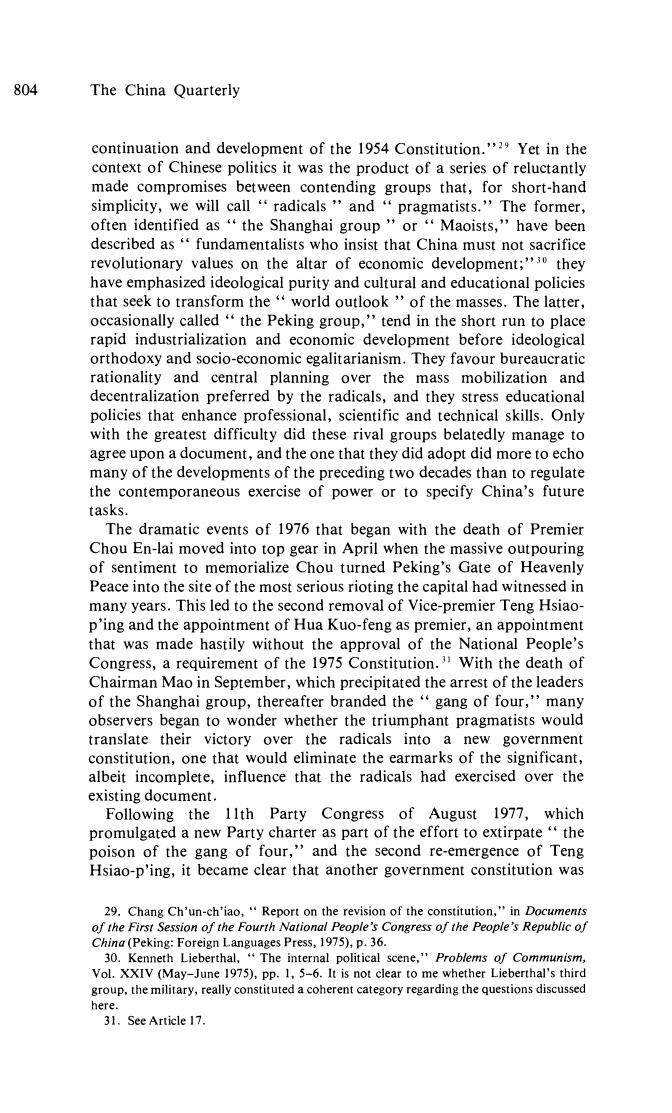正在加载图片...

804 The China Quarterly continuation and development of the 1954 Constitution.'2 Yet in the context of Chinese politics it was the product of a series of reluctantly made compromises between contending groups that,for short-hand simplicity,we will call radicals"and"pragmatists."The former, often identified as "the Shanghai group"or "Maoists,"have been described as 'fundamentalists who insist that China must not sacrifice revolutionary values on the altar of economic development;'30 they have emphasized ideological purity and cultural and educational policies that seek to transform the "world outlook "of the masses.The latter, occasionally called "the Peking group,"tend in the short run to place rapid industrialization and economic development before ideological orthodoxy and socio-economic egalitarianism.They favour bureaucratic rationality and central planning over the mass mobilization and decentralization preferred by the radicals,and they stress educational policies that enhance professional,scientific and technical skills.Only with the greatest difficulty did these rival groups belatedly manage to agree upon a document,and the one that they did adopt did more to echo many of the developments of the preceding two decades than to regulate the contemporaneous exercise of power or to specify China's future tasks. The dramatic events of 1976 that began with the death of Premier Chou En-lai moved into top gear in April when the massive outpouring of sentiment to memorialize Chou turned Peking's Gate of Heavenly Peace into the site of the most serious rioting the capital had witnessed in many years.This led to the second removal of Vice-premier Teng Hsiao- p'ing and the appointment of Hua Kuo-feng as premier,an appointment that was made hastily without the approval of the National People's Congress,a requirement of the 1975 Constitution."With the death of Chairman Mao in September,which precipitated the arrest of the leaders of the Shanghai group,thereafter branded the"gang of four,"many observers began to wonder whether the triumphant pragmatists would translate their victory over the radicals into a new government constitution,one that would eliminate the earmarks of the significant, albeit incomplete,influence that the radicals had exercised over the existing document. Following the 11th Party Congress of August 1977,which promulgated a new Party charter as part of the effort to extirpate'the poison of the gang of four,"'and the second re-emergence of Teng Hsiao-p'ing,it became clear that another government constitution was 29.Chang Ch'un-ch'iao,"Report on the revision of the constitution,"in Documents of the First Session of the Fourth National People's Congress of the People's Republic of China(Peking:Foreign Languages Press,1975),p.36. 30.Kenneth Lieberthal,"The internal political scene,"Problems of Communism, Vol.XXIV (May-June 1975),pp.1,5-6.It is not clear to me whether Lieberthal's third group,the military,really constituted a coherent category regarding the questions discussed here. 31.See Article 17.804 The China Quarterly continuation and development of the 1954 Constitution."29 Yet in the context of Chinese politics it was the product of a series of reluctantly made compromises between contending groups that, for short-hand simplicity, we will call " radicals " and " pragmatists." The former, often identified as " the Shanghai group " or " Maoists," have been described as " fundamentalists who insist that China must not sacrifice revolutionary values on the altar of economic development;"30 they have emphasized ideological purity and cultural and educational policies that seek to transform the " world outlook " of the masses. The latter, occasionally called " the Peking group," tend in the short run to place rapid industrialization and economic development before ideological orthodoxy and socio-economic egalitarianism. They favour bureaucratic rationality and central planning over the mass mobilization and decentralization preferred by the radicals, and they stress educational policies that enhance professional, scientific and technical skills. Only with the greatest difficulty did these rival groups belatedly manage to agree upon a document, and the one that they did adopt did more to echo many of the developments of the preceding two decades than to regulate the contemporaneous exercise of power or to specify China's future tasks. The dramatic events of 1976 that began with the death of Premier Chou En-lai moved into top gear in April when the massive outpouring of sentiment to memorialize Chou turned Peking's Gate of Heavenly Peace into the site of the most serious rioting the capital had witnessed in many years. This led to the second removal of Vice-premier Teng Hsiaop'ing and the appointment of Hua Kuo-feng as premier, an appointment that was made hastily without the approval of the National People's Congress, a requirement of the 1975 Constitution.3l With the death of Chairman Mao in September, which precipitated the arrest of the leaders of the Shanghai group, thereafter branded the " gang of four," many observers began to wonder whether the triumphant pragmatists would translate their victory over the radicals into a new government constitution, one that would eliminate the earmarks of the significant, albeit incomplete, influence that the radicals had exercised over the existing document. Following the 11th Party Congress of August 1977, which promulgated a new Party charter as part of the effort to extirpate " the poison of the gang of four," and the second re-emergence of Teng Hsiao-p'ing, it became clear that another government constitution was 29. Chang Ch'un-ch'iao, " Report on the revision of the constitution," in Documents of the First Session of the Fourth National People's Congress of the People's Republic of China (Peking: Foreign Languages Press, 1975), p. 36. 30. Kenneth Lieberthal, " The internal political scene," Problems of Communism, Vol. XXIV (May-June 1975), pp. 1, 5-6. It is not clear to me whether Lieberthal's third group, the military, really constituted a coherent category regarding the questions discussed here. 31. See Article 17